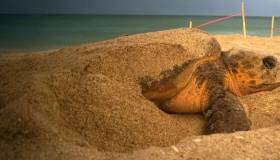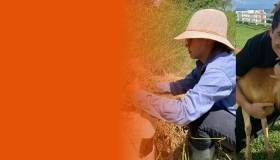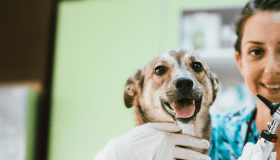
November 16, 2017 – In early June, Dr. Kevin Fitzgerald was out in Jefferson County, Colorado, tracking rattlesnakes. He was on the trail (or tail) of 10 males and 10 females he previously had equipped with transmitters. Dr. Fitzgerald, teaming up with Jefferson County Open Space, is conducting a two-year study of rattlesnakes in the area to learn more about their biology, and to better understand the wonder of their lives.
“If it has a heartbeat, I love it,” said Dr. Fitzgerald.
While rattlesnakes might not be most people’s choice for a study subject, for Dr. Fitzgerald it’s a living being worthy of our understanding. It’s his passion for animals that also draws him to Morris Animal Foundation, and inspires his support for an organization whose mission is to advance the health of animals.
Along with his sideline of conservation work, Dr. Fitzgerald is a well-known veterinarian in the Denver area, practicing at VCA Alameda East Veterinary Hospital; and regularly featured on Animal Planet’s popular show “Emergency Vets.” He also has a weekly television segment on Denver’s Channel 2 morning news and, with all that, is a nationally touring comedian exploring the lighter side of life. He’s written 61 book chapters for various veterinary texts, and pens animal health columns for a variety of magazines.
Throughout his life, a dedication to science, nature, education and the animals with whom we share our planet, have led him to a sense of moral responsibility to preserve and protect life on earth. It’s why he is inspired to share with others the importance of Morris Animal Foundation to that cause. Through early support of the Foundation’s memorial card program and traveling with former board president Betty White for comedy tours, he has supported the critical work of the Foundation to advance animal health.
“We didn’t inherit the earth, we borrowed it from our kids,” said Dr. Fitzgerald. “We have a responsibility to the next generation. We have a moral responsibility to preserve and protect life on earth. I like what Morris does with education – research and education are the hope for the next generation of veterinarians. It’s the only way we will get through these problems.”
Great strides have been made in veterinary medicine, even in just the last 35 years since Dr. Fitzgerald graduated from veterinary school. Specialty areas such as oncology and cardiology, dermatology and radiology, and a host of others once unheard of in private practices, have exploded as veterinarians have had to specialize, just as human doctors do, to keep pace with advances in veterinary medicine.
“Dogs and cats have better care than ever before,” said Dr. Fitzgerald. “My folks were Irish people and I don’t think our dogs or cats ever went to the vet. I remember once our cat had a big abscess on the side of his head and my dad telling me that Snowball had special saliva to lick and heal himself. Today, the public asks more and expects more than ever before and rightly so. The standard of care is changing quickly and what we offer has to keep up.”
But for Dr. Fitzgerald, keeping up with the latest veterinary medical practices is not enough. He encourages veterinarians to get involved with conservation and interdisciplinary studies not only to advance and protect animal health, but to look out for humans, too.
“When I talk to my virology friends, it’s not a matter of if we are going to be hit by a big virus, like the flu pandemic in 1918, it’s a matter of when and from where,” said Dr. Fitzgerald. “It’s important to understand that our health and the health of animals and the environment is intricately connected – this big idea of One Health. Emerging diseases tend to be zoonotic (animal to human) in nature and veterinarians play an important role in unraveling and understanding these diseases.”
What has driven veterinary medicine forward is a growing body of knowledge that asks ever new and changing questions.
“In veterinary medicine, we base things on science – you are entitled to your own opinions but not your own facts,” said Dr. Fitzgerald. “Research has revolutionized the vaccines we use. Just since I got out of school we have new parvo, feline leukemia, and canine influenza vaccines for brand new diseases. We are seeing diseases evolve and science evolves with them to counter and take care of living beings affected by these illnesses.”
Pharmacology, notes Dr. Fitzgerald, is much safer (when he got out of school arsenic was used to treat heartworm). And MRIs, CTs, and other advanced diagnostic tools were the stuff of Buck Rogers. But with all the advances, Dr. Fitzgerald said, he is realistic about a few particular challenges: keeping veterinary medicine affordable for pet owners; the sheer volume of information veterinarians must consume every year to stay current; and a sentiment in the country less supportive of science.
“In this country right now we see a real anti-science sentiment,” said Dr. Fitzgerald. “It’s a shame. Research is critical to what we do. If you look at the last 2,000 years, the scientific method has been in place only for the last 150 years. But the biggest advances in my life have been through science. I remember polio. I was the first class, in 1959, vaccinated with the Salk vaccine. When that vaccine came out, it gave people hope. The space race in response to Sputnik, the man on the moon, the riddle of DNA, digital computers and microchips, and, that wonder of wonders, an internet that changed life forever – all from science.
“Science freed people from the darkness of superstition and took them into the light of a new age. When did so many people become so vocal against science?
“What happens in the laboratories directly affects how I practice, and advances how I practice and what I do. We have to protect science and support it, and the work has to be credible and accessible and verifiable. But we can’t rest on our laurels. The world is changing; new problems arising that we haven’t seen or haven’t been able to treat more effectively - canine influenza, kidney disease, animal cancers, and orthopedics. The focus when I graduated was pediatrics, not on geriatrics – but with the graying of baby boomers and graying of pets, that’s a lot of what I see now. It’s a whole new set of veterinary issues to be researched and resolved.”
That, said Dr. Fitzgerald, is the beauty of Morris Animal Foundation. A continuing research quest for new knowledge, new ideas, and new ways to save animal lives. And, it’s not just companion animals; it’s wildlife, too.




